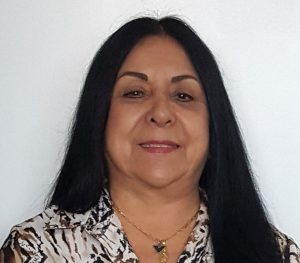Chula Vista resident Rachael Ortiz, 77, received a pardon from Gov. Edmund G. Brown Jr. late last year.
“The Friday before Christmas I got a call from the legal department of Governor Brown,” said Ortiz. She was told her pardon had been granted. “I had tears in my eyes.”

Ortiz had applied in June. The pardon form is two pages and there is no cost to apply. Ortiz represented herself.
A pardon represents full legal forgiveness for a crime, removing any remaining prison sentence, unpaid fines or probation conditions.
The first person she called was Paul F. Chavez, son of Cesar Chavez who was a civil rights activist and co-founded the National Farm Workers Association which later became the United Farm Workers in 1962 along with Dolores Huerta.
Chavez, president of the Cesar Chavez Foundation, wrote a letter on behalf of Ortiz that was submitted with the paperwork requesting the pardon.
“More than five decades ago, our movement and my father took a chance on a young woman who was committed to turning her life around by selflessly dedicating herself to the poorest and most needy among us,” Chavez said.
“Through many years of collaboration and friendship, Cesar Chavez came to respect Rachael’s integrity and talent. Over 52 years, she has shown herself worthy of that trust.
Today, she embodies my dad’s values of self-sacrifice and committing yourself to a cause bigger than any one person. We are gratified Governor Brown has also recognized Rachael’s lifetime of good deeds on behalf of others.”
Ortiz wanted to continue a life of post incareration service, which is what prompted her to make her request.
“I decided to apply for a pardon because of one of my very important desires,” she said, “to serve on the California Coastal Commission. I’m going to look out for the Barrio Logan community. We’re the last Mexican-American waterfront community in the state of California.”
Ortiz wants a citizen or public member position on the body that oversees land use along the state’s coastline.
The pardon issued by Gov. Brown dated Dec. 24 stated Ortiz was sentenced on or about
Feb. 18, 1965, for the crime of possession of a controlled substance.
She served 11 months in prison and received three years, 1 months on parole.
In Gov. Brown’s pardon he wrote: “Ortiz received an order dated Sep. 20, 1991, evidencing that since her release from custody, she has lived an honest and upright life, and exhibited good moral character, and conducted herself as a law-abiding citizen. Ortiz helped establish Barrio Station, a San Diego based-non-profit that has provided services and resources to thousands of at-risk youth in the region, received numerous awards and recommendations including from the California State Senate, State assembly, and the city of San Diego.”
Others who submitted letters with her pardon application included state Sen. Ben Hueso, 40th District; her former parole agent Joan Thompson Dudsches; Rev. Richard H. Brown; and Legal Aid Society of San Diego Inc. CEO Gregory E. Knoll Esq.
According to Ortiz, her backstory includes overcoming challenges in her youth: her mother’s death when she was 4 years old, her father, unable to take care of her and her four sisters relinquished them into the custody of the county. In her youth she eventually fell into drug use.
Ortiz, who never married or had children, considers the thousands of youths who benefitted from her work as her children. Her four other sisters are deceased.
Her conviction at 22 also prohibited her from staying in San Diego. She ended up in San Francisco’s Mission District. There she encountered volunteers from the Chavez organization.
Ortiz cites being recruited by co-founder Dolores Huerta as a turning point for her.
“She (Huerta) gave me so much work to do volunteering for them,” said Ortiz. Ortiz’s continued work there also set her up to eventually joining the staff of the San Diego based Barrio Station. She is now the executive director of Barrio Station and has been there for what will be her forty-ninth year in January 2019.
“I want to inspire others to get out of that whole system,” said Ortiz, “to apply for a pardon.”














